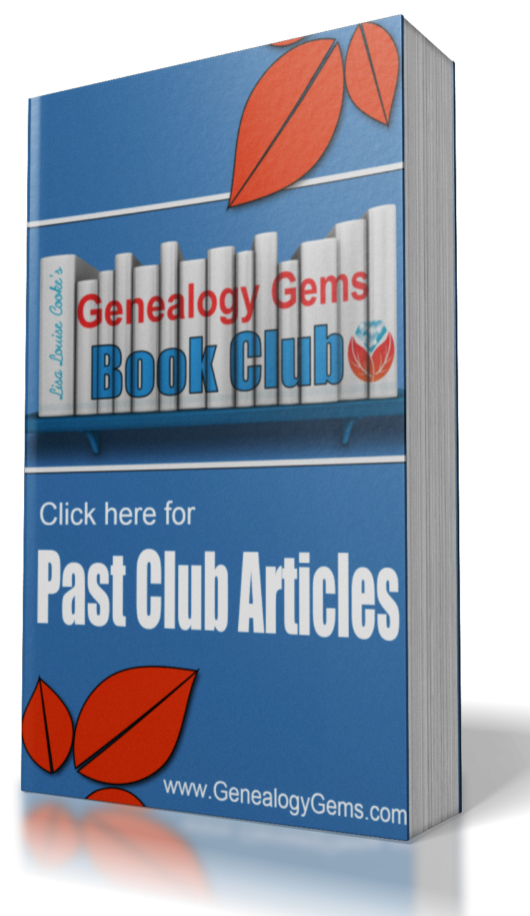by Lisa Cooke | Oct 30, 2017 | 01 What's New, Archive Lady, Volunteer
The National Archives Citizen Archivist program is recruiting help to tag, transcribe, and comment on records in the U.S. National Archives catalog. This is a great way for genealogy volunteers to help others discover their family history in the National Archives and learn for themselves what’s there.
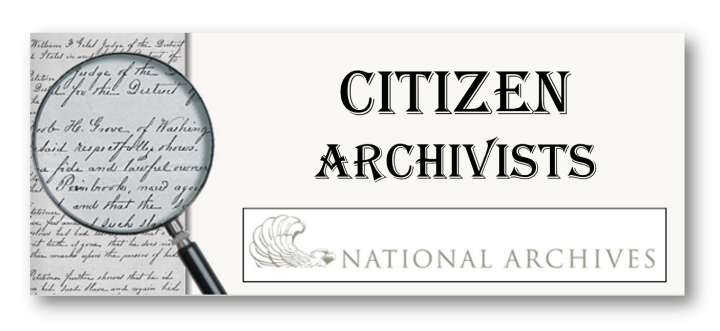
The National Archives Citizen Archivist Program
Have you heard? The U.S. National Archives is looking for Citizen Archivists! What is a Citizen Archivist, you ask? A Citizen Archivist is a virtual volunteer that helps the U.S. National Archives increase the online access to their historical records. This is done by crowdsourcing metadata about their records through tagging, transcribing, and adding comments to the U.S. National Archives catalog.
As a Citizen Archivist, you will be volunteering your time to make historical and genealogical records more accessible to the general researching public to help them with their research. This could include genealogists, historians, writers, and other researchers that will benefit from your volunteer work. And who knows, maybe you will find records that belong to your ancestors!
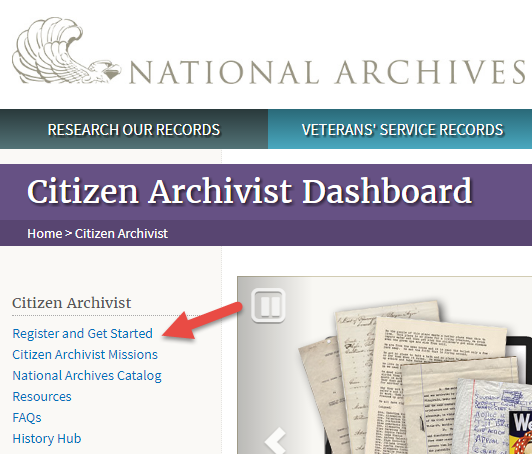 How to Get Started as a National Archives Citizen Archivist
How to Get Started as a National Archives Citizen Archivist
First, you will need to go to the “Citizen Archivist Dashboard” at the U.S. National Archives website. Once there, you will need to register to be a Citizen Archivist (see the screenshot on the right for where to click). Registration is free but you do need this account to be able to contribute to the project. Once you are registered and logged in, you can then navigate to the catalog and choose records from the curated missions.
The “missions” are groups of records that need transcribing or tagging to help the records be more accessible to researchers working online. Some of the missions that are needing transcribing are “Fugitive Slave Case Files,” “Native American Reservations,” and “The Truman-Churchill Telegrams,” just to name a few. New missions are added to the site regularly, so be sure to check back often to see what is new that you would like to work on.
Who Can Contribute as a Citizen Archivist?
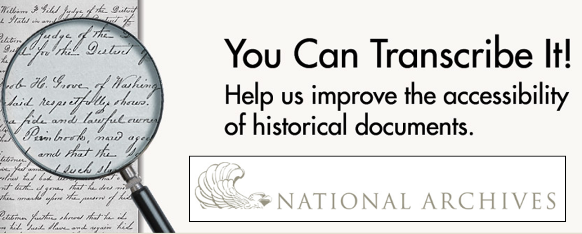 Anyone who has a computer and the willingness to volunteer time to this project can contribute. You do not need to commit to any amount of time; you can work at your own pace as you have the extra time. There is even a support community available through the “History Hub” that can answer your questions as you work through the records. (You can click on that at the bottom of the list shown in the screenshot above.)
Anyone who has a computer and the willingness to volunteer time to this project can contribute. You do not need to commit to any amount of time; you can work at your own pace as you have the extra time. There is even a support community available through the “History Hub” that can answer your questions as you work through the records. (You can click on that at the bottom of the list shown in the screenshot above.)
So, if you have some time on your hands and want to help make historical and genealogical records more accessible online, why not become a Citizen Archivist today? Click here to get started–or click below to read more ideas about how to give back to the genealogy community.
 The Unclaimed Persons Project
The Unclaimed Persons Project
Help Curate Holocaust-Era Newspaper Articles
Transcribe GPS Gravestone Images at BillionGraves
by Lisa Cooke | Jun 9, 2017 | 01 What's New, Archives
A lot of the best information about our ancestors’ lives is buried in an archive–NOT indexed online! Melissa Barker explains what an archive is and how to find one that might reveal secrets from your family history.
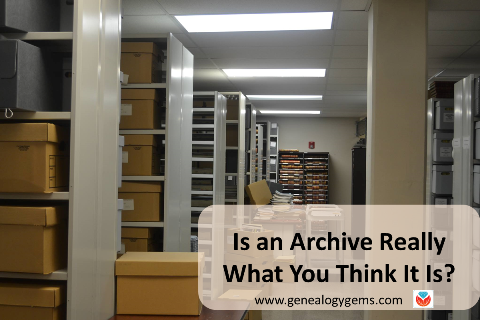
International Archives Day is Friday, June 9! Genealogy Gems contributing archivist Melissa Barker tells us what an archive IS and how to find one.
Recently, I was asked “What is an archive?” I was a bit surprised by this question since it came from a genealogist. I thought all genealogists knew about archives!
What exactly is an archive?
An archive is defined by the Society of American Archivists as: An organization that collects the records of individuals, families, or other organizations. The “organization” they are talking about could be any organization. It doesn’t have to be only a county archive, such as the Houston County, Tennessee Archive, or a state archives, like the California State Library and Archives. Archives include:
- A historical society that collects and preserves local records is also considered an archive.
- A genealogical society that accepts donations of family records is an archive.
- A museum that has exhibits and displays may also have records collections and would be considered an archive.
- Local public libraries that have genealogy rooms with records in them are archives.
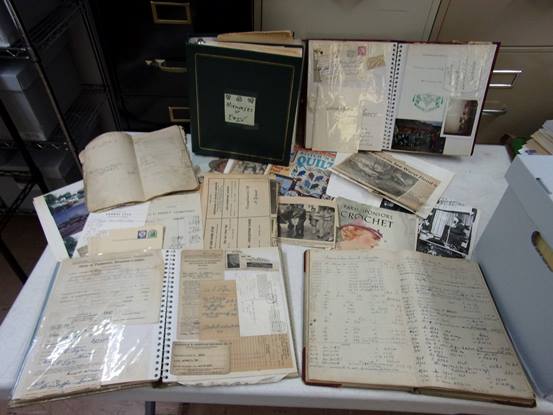 The term “archive” is not solely used to represent a county or state archive. Any organization that accepts, collects and preserves historical and genealogical documents, records, memorabilia and artifacts is considered an archive, even if they don’t have the word “archive” in their title.
The term “archive” is not solely used to represent a county or state archive. Any organization that accepts, collects and preserves historical and genealogical documents, records, memorabilia and artifacts is considered an archive, even if they don’t have the word “archive” in their title.
There are many different kinds of archives that can be accessed by genealogists. I always say, “There is an archive for everything.” Just because the building doesn’t have the word “archive” on it, don’t discount the fact that there is a “place” where there are historical and genealogical records being preserved or at the very least stored.
Tips for finding and visiting archives
The next time you are doing research on your ancestor in the area where they lived…
Ask around: There is always someone in the local area that knows the local history and knows many of the local families and most importantly; these people usually know where to find the records! This person may even be able to tell you about the family you are researching.
Ask around in the community, call the local library or the local Chamber of Commerce and ask, “Who is the local historian, who is the one knows about the families and history of the area?” I guarantee that you will be given a name. Ask where the records are stored or archived. Contact the local historical and/or genealogical society.
Be prepared to get dusty: There have been many times when I had arrived at the place where I was told the records were located. I was then shown a closet, the attic or basement and I was left to my own research devices to go through boxes and shelves of records. You have to ask the questions and you may even have to do some sleuthing in the local areas your researching in to locate the records.
Don’t leave any stone unturned. The records you are looking for could be sitting in boxes, archived or not, just waiting for you to find them. Remember: It’s not all online, contact or visit and archive today!
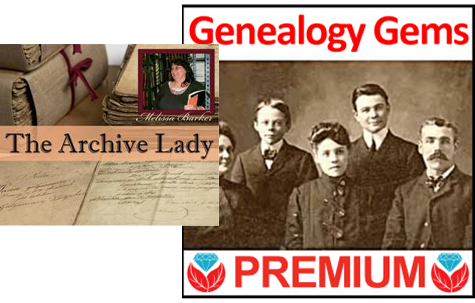 The Archive Lady, Melissa Barker shares a short archiving segment in the Genealogy Gems Premium Podcast, available to Genealogy Gems Premium website members. Premium website members have access to the entire Premium Podcast archive of more than 200 episodes AND more than two dozen video classes by internationally-known genealogy educator Lisa Louise Cooke. Genealogy Gems Premium Membership offers so many fun and innovative ways to do genealogy! Click here and start enjoying it today.
The Archive Lady, Melissa Barker shares a short archiving segment in the Genealogy Gems Premium Podcast, available to Genealogy Gems Premium website members. Premium website members have access to the entire Premium Podcast archive of more than 200 episodes AND more than two dozen video classes by internationally-known genealogy educator Lisa Louise Cooke. Genealogy Gems Premium Membership offers so many fun and innovative ways to do genealogy! Click here and start enjoying it today.
by Lisa Cooke | Oct 19, 2015 | 01 What's New, Ancestry, NARA
The US National Archives has signed agreements with FamilySearch and Ancestry to put more of the Archives’ unique genealogical treasures online. We think that’s worth shouting about!
The National Archives has been working with FamilySearch and Ancestry for years to digitize genealogical treasures from its vaults. Contracts have been signed to continue efforts with both partners to digitize even MORE genealogy records at the National Archives: MORE birth, marriage, death, immigration and military service records! Here are some highlights from the contract:
1. Partners will now “be able to post segments of large collections immediately, rather than waiting for the entire collection to be completed.” This sounds familiar to users of FamilySearch, which regularly dumps un-indexed chunks of digitized content onto its site just to make it available faster.
2. The updated agreement contains provisions to protect “personally identifying information.”
3. Ancestry will have a shorter time period (by 12-24 months) during which they have exclusive rights to publish the images together with the index. After that, the National Archives can put the material on its site and/or share it with other partners.
4. The National Archives “will continue to receive copies of the digital images and metadata for inclusion in its online catalog….The public will be able to access these materials free of charge from National Archives research facilities nationwide [not online]. Ancestry.com makes the digitized materials available via subscription.”
What kind of data is already online from The National Archives?
FamilySearch and Ancestry already host digital images of millions of National Archives documents: U.S. federal censuses. Passenger lists. Border crossings. Naturalization records. Compiled military service records. Freedman’s Bank and Freedmen’s Bureau records (the latter are currently being indexed). Federal taxation records. And the list goes on! According to the press release, before these partnerships began, “many of these records were only available by request in original form in the research rooms of the National Archives.”
Click here  to search all the National Archives content on Ancestry (more than 170 million images; subscription required to view).
to search all the National Archives content on Ancestry (more than 170 million images; subscription required to view).
Just in case you’re wondering (and I was wondering), The National Archives isn’t playing favorites with their partnerships. This list shows that a National Archives partnership is pending with Findmypast. They’re already working with Fold3. I wasn’t surprised to see the John F. Kennedy Library on their list, but I wouldn’t have guessed the Royal Commission on the Ancient and Historical Monuments of Scotland!
Click to read more National Archives gems on our website:
Celebrate the U.S. Constitution with National Archives Resources
National Archives Digitizing Projects: Colonial, WWII, Jewish and More
National Archives Regional Facilities Closing or Consolidating
by Lisa Cooke | Sep 17, 2015 | 01 What's New, History, images, United States, YouTube
 Today is Constitution Day: the 228th anniversary of the signing of the U.S. Constitution. The National Archives is celebrating with free programs and a special Family Day.
Today is Constitution Day: the 228th anniversary of the signing of the U.S. Constitution. The National Archives is celebrating with free programs and a special Family Day.
Most of us won’t be able to attend in person, but the National Archives will be webcasting several of its free public programs live on the National Archives YouTube Channel. These include:
Our Lost Constitution: The Willful Subversion of America’s Founding Document. Thursday, September 17, 12 pm. “Senator Mike Lee (R-UT) tells dramatic, little-known stories behind six of the Constitution’s most indispensable provisions and explains why some of today’s issues are the direct result of how the courts, Congress, and the executive branch have minimized or ignored them. A book signing will follow the program.”
The Young Madisons: Why a New Generation Is Standing Up for the Constitution. Thursday, September 17, 7 pm. “A rising generation of civic leaders, shaped by the digital revolution, is reaffirming its commitment to the rights-based principles of the U.S. Constitution. The ninth annual State of the Constitution Lecture at the National Archives…focuses on the voices of young leaders in the spheres of policy, governance, and citizen engagement who are shaping America’s future as a constitutional democracy.”
The Constitution: An Introduction. Wednesday, September 30, 12 pm. “Practically every aspect of American life is shaped by the Constitution….Yet most of us know surprisingly little about the Constitution itself. In his book The Constitution, professor Michael S. Paulsen, one of the nation’s leading scholars of constitutional interpretation, has written a lively introduction to the supreme law of the United States, covering the Constitution’s history and meaning in clear, accessible terms, and provides us with the tools to think critically and independently about constitutional issues.”
More on the U.S. Constitution from the National Archives:
Will you be in town that day? Here’s what you should know:
- The original U.S. Constitution is on permanent display in the National Archives. Museum hours are 11:30 a.m. to 5:30 p.m. due to a morning naturalization ceremony (which is not open to the public).
- Programs will be held in the William G. McGowan Theater, unless otherwise noted. Attendees should use the Special Events entrance on Constitution Avenue at 7th Street, NW. Metro accessible on the Yellow and Green lines, Archives/Navy Memorial/Penn Quarter station.
- FAMILY DAY: Between 1-4 pm in the Boeing Learning center there will be special hands-on activities for families and children.
- Advance registration is required for the free program “The Young Madisons.”
More Resources
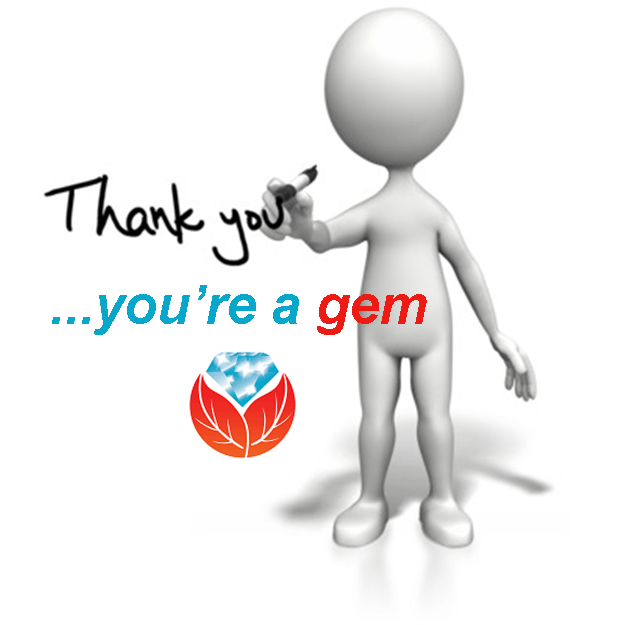 Sometimes we recommend resources available through ShopFamilyTree, Amazon and other affiliates. If you decide to purchase these, thank you for using our links which supports the free Genealogy Gems blog and podcast!
Sometimes we recommend resources available through ShopFamilyTree, Amazon and other affiliates. If you decide to purchase these, thank you for using our links which supports the free Genealogy Gems blog and podcast!
by Lisa Cooke | Jul 16, 2015 | 01 What's New, History, images, Inspiration, Libraries, Memory Lane, Volunteer
 By now, many of us have tried our hand at volunteer indexing and transcribing projects. We can index censuses, civil and church vital records, gravestone images, and more with FamilySearch, BillionGraves, Ancestry’s World Archives Project and even with individual archives like The Congregational Library.
By now, many of us have tried our hand at volunteer indexing and transcribing projects. We can index censuses, civil and church vital records, gravestone images, and more with FamilySearch, BillionGraves, Ancestry’s World Archives Project and even with individual archives like The Congregational Library.
What about de-classified CIA records and other government documents? Love letters between President Lyndon and Lady Bird Johnson? These are among the indexing projects currently on the National Archives (US) Citizen Archivist dashboard.
“We have millions of pages of digitized records available in our online catalog,” says the Citizen Archivist website. “Transcription is an important way for us to improve search results and increase accessibility to our historical records. Your contributions make a big impact.” Other current projects include Confederate government papers, interviews relating to the September 11 terrorist attacks and letters to President Eisenhower about integrating schools.
These are all historically vital important records for the U.S. that may also shed light on our ancestors’ lives. My grandfather worked on classified government projects and I’m hoping to find his name in formerly “top secret” papers someday! Why not give it a try–index a batch of records through the National Archives Citizen Archivist project?
 Learn more about inspiring genealogy volunteers on our blog! On the lower left side of the Genealogy Gems home page, click the category “Volunteer.” See what others do to help–and perhaps you’ll get inspired yourself!
Learn more about inspiring genealogy volunteers on our blog! On the lower left side of the Genealogy Gems home page, click the category “Volunteer.” See what others do to help–and perhaps you’ll get inspired yourself!

 How to Get Started as a National Archives Citizen Archivist
How to Get Started as a National Archives Citizen Archivist Anyone who has a computer and the willingness to volunteer time to this project can contribute. You do not need to commit to any amount of time; you can work at your own pace as you have the extra time. There is even a support community available through the “History Hub” that can answer your questions as you work through the records. (You can click on that at the bottom of the list shown in the screenshot above.)
Anyone who has a computer and the willingness to volunteer time to this project can contribute. You do not need to commit to any amount of time; you can work at your own pace as you have the extra time. There is even a support community available through the “History Hub” that can answer your questions as you work through the records. (You can click on that at the bottom of the list shown in the screenshot above.)
 The Unclaimed Persons Project
The Unclaimed Persons Project
 The term “archive” is not solely used to represent a county or state archive. Any organization that accepts, collects and preserves historical and genealogical documents, records, memorabilia and artifacts is considered an archive, even if they don’t have the word “archive” in their title.
The term “archive” is not solely used to represent a county or state archive. Any organization that accepts, collects and preserves historical and genealogical documents, records, memorabilia and artifacts is considered an archive, even if they don’t have the word “archive” in their title.

